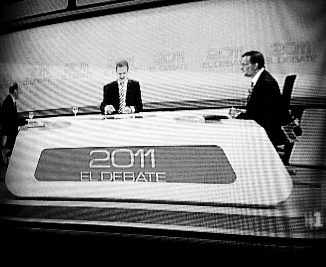Communication Studies

The incestuous relationship between media and politicians
In democratic societies, mass media have been defined as the "fourth power" because of their social influence and their function as a counterbalance to possible abuses by the other powers. In this sense, the media are seen as a tool for invigorating the democratic health of a country. This UAB study has analysed critically how politicians use the mass media to their own ends, according to this study, a continuing practice in Spain that goes back to the dictatorship, and which raises doubts about the legitimacy of the mass media and their function as a public service.
References
“The Clientelistic Nature of Television Policies in Democratic Spain”. Fernández-Quijada, D.; Arboledas, L. (2013), Mass Communication and Society, 16(2), p. 200-221.
Spanish citizens watch television four hours a day and use it as their main news source. The relevance of a media such as television allows its study as an indicator of the democratic health of a country.
In the international context, Spanish democracy is still young. It inherited the clientelistic structures of the previous dictatorship, that is, a system where clients and patrons interchange mutual favours with public resources but without meritocratic guarantees. Once democracy arrived, some of these structures remained but its control went to the new elected governments.
This study lead by a lecturer from the UAB analyzes four key dimensions of media-political clientelism during the last democratic period: license granting, television ownership regulation, politicization of the public service, and partisan news coverage.
The political demand for a favourable journalistic coverage of the own political party was rewarded with licenses granted according to political affinity and not merits. At the same time, media concentration policies have relaxed its limits according to the needs of specific media groups. Regarding public television, its continuous bias has eroded its public service function. With independence of the ideology of the ruling parties, there have been a set of political decisions which have privileged the private interest of certain individuals and organizations instead of the common interest of the whole citizenship, which was supposed to be represented by those same parties.
This article sheds light on the democratic shortfalls of TV regulation throughout the last three decades. The relevance of these results is that they pose serious doubts about the theories on media systems, which sustain that the democratization of a country implies a higher degree of journalistic independence and professionalization and that clientelism is a typical phenomenon of authoritarian political systems; it is usually claimed that it tends to disappear in a democratic context.
On the contrary, these results illustrate how healthy clientelism is in the Spanish democracy and how it has successfully adapted its objectives and its structures to formal systems of independence like those required by the European Union.
David Fernández-Quijada
Department of Audiovisual Communication and Advertising
2025 Universitat Autònoma de Barcelona
B.11870-2012 ISSN: 2014-6388
